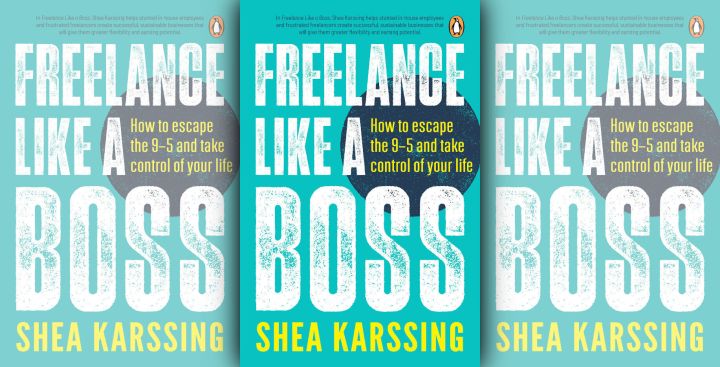BOOK EXCERPT
How to avoid feast or famine – 8 tips for freelancers from ‘Freelance Like a Boss’

Want to start freelancing but don’t know where to begin? In ‘Freelance Like a Boss’, Shea Karssing explains how to escape the 9-5 and take control of your life.
Are you feeling stuck and limited in your job? Are you waiting for the next bonus, the next promotion, the next public holiday, the next best thing?
In Freelance Like a Boss, Karssing helps stunted in-house employees and frustrated freelancers create successful, sustainable businesses that will give them greater flexibility and earning potential.
The book presents relatable, honest and sometimes irreverent insights into the freelance world. Read an excerpt below.
***
How to avoid feast or famine
One month you’re buying butter at Woolworths (quick public service announcement: it’s R35 cheaper on special at Spar! You should not be buying it from Woolworths, no matter how much you invoiced that month); the next, you’re searching for coins in the couch to buy a bag of Spookies.
Some think it’s the freelancer’s lot in life; I say it doesn’t have to be that way. I’m not a finance guru, but I do have some advice that’s worked well for me.
Get a regular retainer client who pays on time
We all know that sound on the first of the month: ‘Beep-beep, beep-beep, beep-beep’ as the debit orders set your phone vibrating into space and your bank account funds spiralling down. When the dreaded debit-order day looms, you need to ensure that you have enough funds to cover your regular monthly expenses.
Read in Daily Maverick: Why the taxman considers freelancers high risk
I suggest finding one or more retainer clients who pay their bills at a set time every month and pay you enough to cover all the expenses coming off on debit-order day. If you can’t guarantee that all expenses will be covered by income from your regular, pay-on-time retainer clients, perhaps try moving a few of your debit orders to later in the month. I would also recommend seeing what expenses you can eliminate or reduce, but that’s a conversation for a different book and a different author (in the meantime, stop buying butter at Woolworths).
Top up with project work and other clients
Once you’ve got a reliable retainer that pays for all the boring stuff, add another retainer or client with a regular scope of work to cover the expenses that go beyond debit-order day (groceries, medical bills, etc.) and some project-based or ad hoc work to make up the rest of your monthly goal and fun fund.
Charge an upfront deposit
Getting a client to pay a portion upfront helps you better align your interests from the beginning. Clients are more responsive and invested in the project when they’ve already had to cough up some cash at their end. It also helps mitigate risk and allows you to spread out your income like the mollycoddled kids at varsity who get their pocket money weekly so they don’t blow a month’s worth in one night.
Create a famine fund
At the risk of sounding like a financial advisor (which I am not), even your non-freelance friends and family should have an emergency fund: three months’ worth of income (or, at least, the total of three months’ worth of expenses) to keep you afloat should the shit hit. Of course, you likely won’t have three months’ worth of income sitting idle in your bank account; if you do, you might be the one I see buying butter at Woolworths.
If you don’t, you can contribute to your emergency fund monthly until you’re happy that you have enough in there to keep you going for a minimum of three months. But you’re not done yet …
Remember the hourly rate you so painstakingly calculated a few chapters ago? We based it on taking holidays, public holidays, sick days and other non-working hours. So, you’ll also need to make sure that you put a little extra away to allow you to buy butter in the months that are a bit slimmer – and to fund your rock-star lifestyle when ke Dezemba rolls around. Don’t forget about that pesky percentage for the Tax Man too.
If you need some extra motivation to save, you can also refer to your famine fund as your freedom fund – the bucks that give you the freedom to walk away from a toxic client, take time off when you need it, go on a spontaneous adventure, do more training or studying, or just take a month to hang out with your dog. Live your best life; you’ve earned it.
Chat with your financial advisor about the best savings vehicle for your famine/freedom fund. You want to earn a decent amount of interest, but the funds need to be immediately accessible because, well, emergencies don’t come with a 32-day notice period.
Income protection if you’re unable to work
What happens if you’re a copywriter like me, and you lose both hands in a fight with a chainsaw while cutting your toenails? It’s going to take longer than three months to learn to type with your toes, so what do you do? Make sure that you have income protection and/or disability cover and/or severe illness cover. Your financial advisor will be able to help you with the product and amount that’s best suited to your needs.
Income protection, dread disease and disability cover are all insurance products that will give you a monthly pay-out (an amount determined by you) if you’re unable to work owing to serious illness, disability, accident or other serious circumstances defined in your policy. (Unfortunately, it doesn’t apply to that month you want to take off to hang out with your dog.) The more you pay in each month, the more you will get out when you claim. In the meantime, stay away from chainsaws.
Insurance, the obligatory grudge
Still in that meeting with your financial advisor or broker? Great; let them know about your new business venture so that they can recommend the right types of insurance cover that you may need. But don’t let them get ahead of themselves by convincing you to insure everything from your desk to your imaginary dog! I follow a general rule of thumb: if it’s something that could bankrupt you, insure it. If it won’t put you on the bones of your ass to replace it, tell your broker to stop rubbing his hands together.
Retirement savings for when you no longer want to work
One of the safety-net benefits of full-time employment is that you’re often required to contribute to some kind of company pension or provident fund. Whatever you do when you leave your full-time employment, do not blow your provident fund on booze, hookers, holidays, or even something sensible like school fees. Tempting as it may be, blowing the bucks will put some serious brakes on your retirement savings.
As a freelancer, you’re now on your own, and you need to make regular contributions to some kind of retirement product. I see myself going on many milkshake outings from the nursing home, and I want to make sure that I can afford to do so – and I’m talking gourmet freakshakes with the doughnut on top, not the kiddies’ chocolate milkshake from Wimpy. Other than ensuring your independence and funding your freakshake habit later in life, the additional benefit of retirement annuities (RAs) is that they’re tax deductible, which means that the amount you put in is deducted from your taxable income, i.e. paying SARS less now will mean more freakshakes in your future. Saving for retirement is a grind that’s counterintuitive to our default instant-gratification setting, so remember the immediate SARS savings to help keep you on track.
An important caveat: You’re not going to get a sniff of this money before you reach a certain age (determined in your policy’s small print). But because RAs are a long-term investment, you get to benefit from the power of compound interest, so the earlier you start, the better. There are plenty of online calculators available to help you determine how much you need to put away each month, and your financial advisor will be able to guide you in the right direction too. They’ll also be able to help you move your existing product provided by your employer if necessary.
Medical aid and gap cover
Medical aid is another benefit that’s sometimes offered to full-time employees. If you’re lucky, your employer pays the full amount; if you’re still lucky, they contribute a portion for you. If this has been your experience up until now, let me warn you – medical aid is expensive, and if you have a hospital plan, like I do, it basically only covers the serious shit that will land you in a ward with wires sticking out of you. But, whatever you do, get some form of medical cover. It’s something you’ll never regret if you end up needing to use it. I’ve heard some horror stories of people who have been turned away from emergency treatment, lumped with hospital bills in the millions or bled out in the halls of the public healthcare system because they didn’t have some form of medical cover.
There are many medical aid options out there, so chat to your broker about the best one for your circumstances. If you’re relatively young and healthy, you may be better off getting a hospital plan rather than comprehensive cover. Another option is hospital insurance, which is more limited than a standard hospital plan and doesn’t include prescribed minimum benefits. Still, it will cover your ass up to a certain amount if you have an accident and get admitted to hospital. If you have a significant other, you could also look into becoming a dependant on their plan, which makes it cheaper per person.
While you’re at it, there’s also a sneaky little add-on called gap cover, which is a few hundred rands but definitely worth getting. Here’s why: most private hospitals and medical professionals charge higher rates than medical aid rates (the amount that your medical aid is willing to pay them), so gap cover is there to bridge the gap between the medical aid rates and your actual medical bill. Crazy, I know, that you need gap cover to cover what you would hope your expensive medical aid plan would cover. But just suck it up. DM
Freelance Like a Boss by Shea Karssing is published by Penguin Random House SA (R240). Visit The Reading List for South African book news, daily – including excerpts!



















 Become an Insider
Become an Insider
Comments - Please login in order to comment.